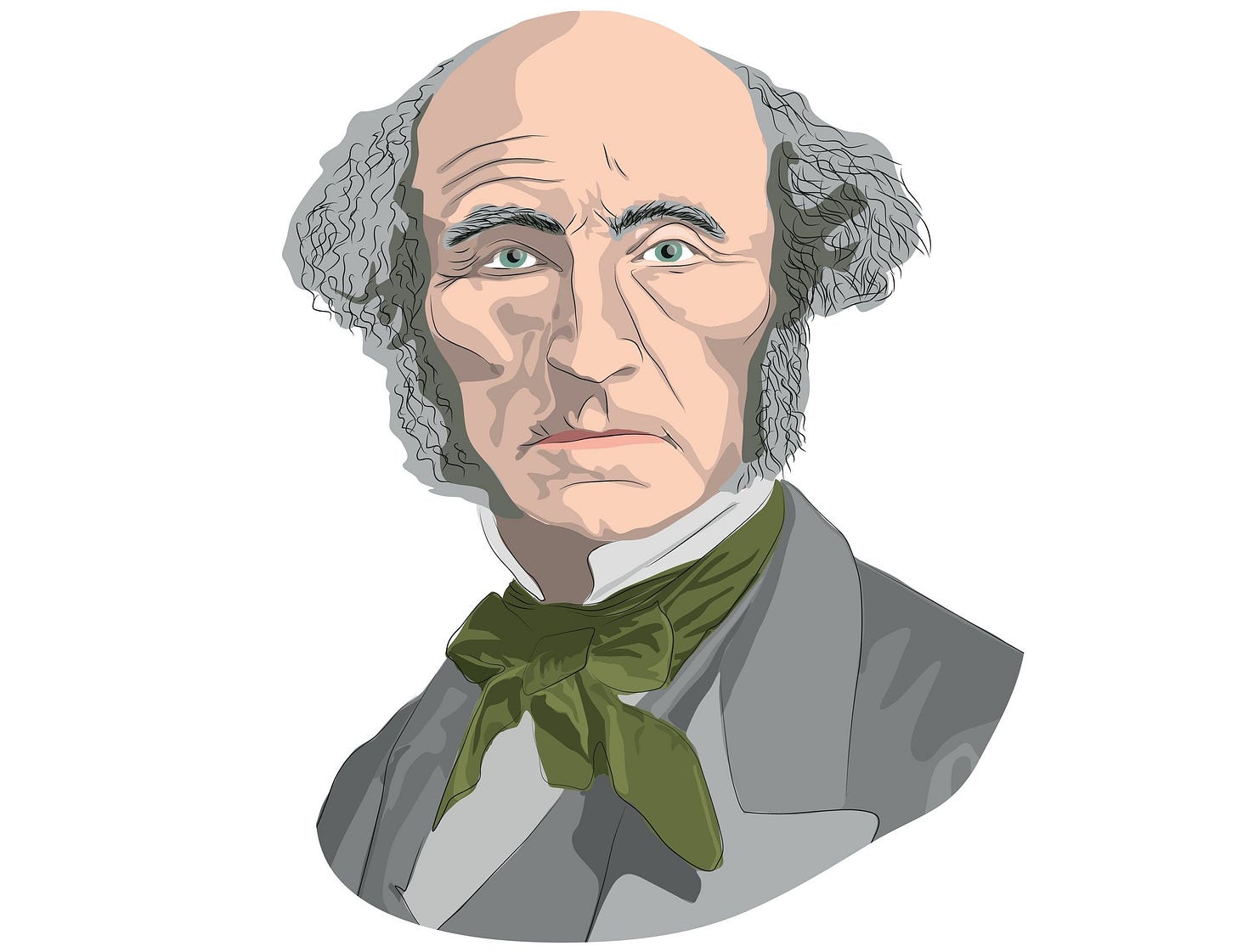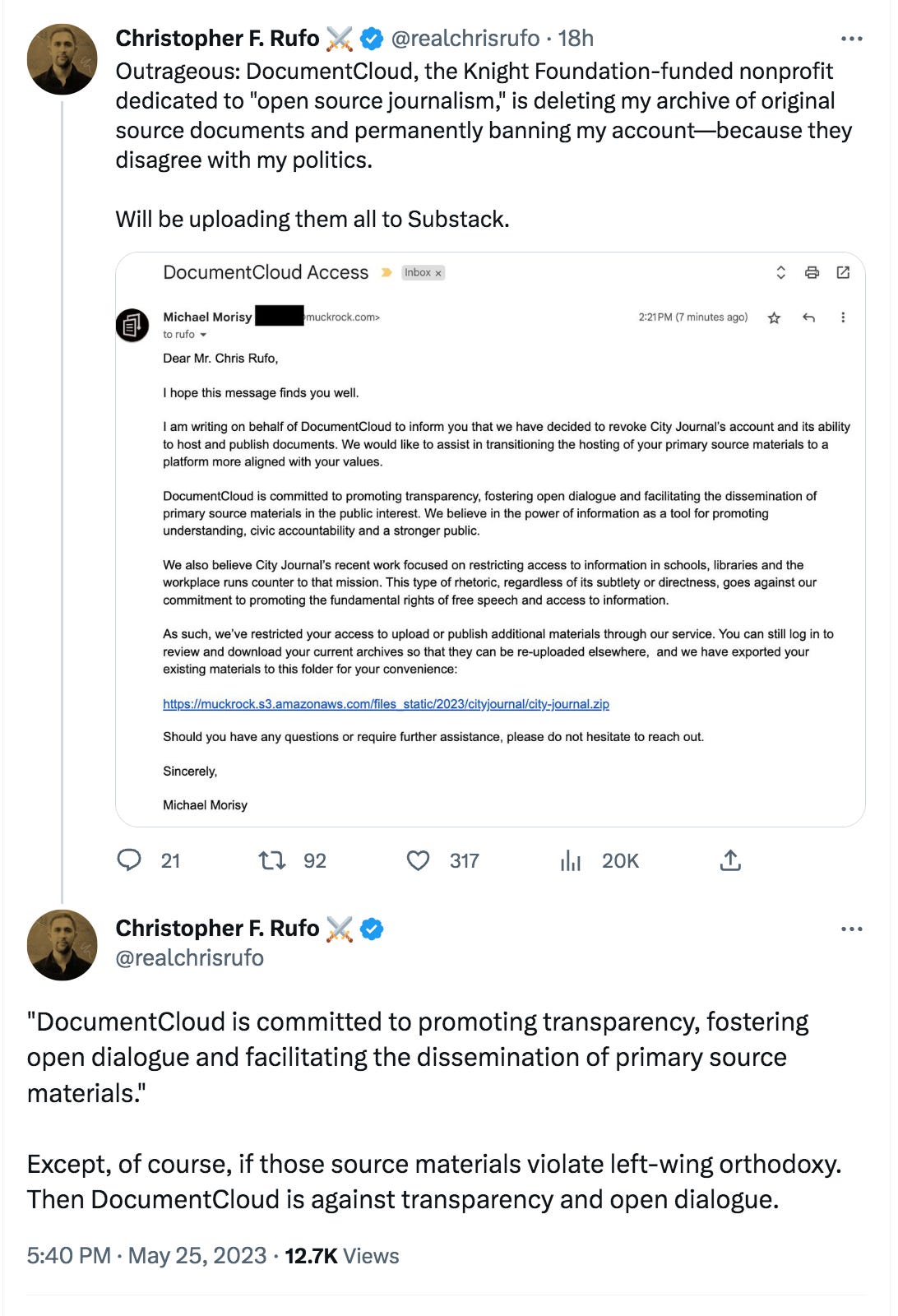E-Pluribus | May 26, 2023
Learning from John Stuart Mill 150 years after his death; trying to get down to the heart of the matter . . . in politics; and high school debate judges who won't put up with debate.
A round-up of the latest and best writing and musings on the rise of illiberalism in the public discourse:
Richard V. Reeves: J.S. Mill vs the Post-Liberals
From the start, humans want their own way and like to be right (anyone who disputes this hasn’t hung around many two year olds - or many people at all, for that matter). Richard Reeves at Persuasion reminds us that the wisdom of John Stuart Mill regarding the importance of free speech and learning from one another still speaks to us today.
Why does free speech matter? Mill believed that the pursuit of truth required the collation and combination of ideas and propositions, even those that seem to be in opposition to each other. He urged us to allow others to speak—and then to listen to them—for three main reasons, most crisply articulated in Chapter 2 of On Liberty.
First, the other person’s idea, however controversial it seems today, might turn out to be right. (“The opinion … may possibly be true.”) Second, even if our opinion is largely correct, we hold it more rationally and securely as a result of being challenged. (“He who knows only his own side of the case, knows little of that.”) Third, and in Mill’s view most likely, opposing views may each contain a portion of the truth, which need to be combined. (“Conflicting doctrines … share the truth between them.”)
For Mill, as for us, this is not primarily a legal issue. His main concern was not government censorship. It was the stultifying consequences of social conformity, of a culture where deviation from a prescribed set of opinions is punished through peer pressure and the fear of ostracism. “Protection, therefore, against the tyranny of the magistrate is not enough,” he wrote. “There needs protection also against the tyranny of the prevailing opinion and feeling.”
Mill never pretended that this would be easy, either at a personal or political level. The humility and openness that is required is hard-won. Our identity as a person must be kept separable from the ideas we happen to endorse at a given time. Otherwise, when those ideas are criticized, we are likely to experience the criticism as an attack upon our self, rather than as an opportunity to think about something more deeply and to grow intellectually. That’s why education is so important. Liberals are not born; we have to be made.
Read it all.
Lance Morrow: Tim Scott and the Politics of Forgiveness
When it comes to today’s political climate and what might be the key to turning down the temperature, Lance Morrow at the Wall Street Journal agrees with Don Henley and “think[s] it's about forgiveness.” While not completely sold on Tim Scott as a presidential candidate, Morrow finds his story, temperament and message compelling and a welcome contrast to the Trump-Biden alternative.
America is stuck—deadlocked, frozen, like the armies on the Western Front in 1917. One side is headquartered at Mar-a-Lago and has no ideas at all beyond revenge and gaudy vindication. The other side bivouacs at the White House and has far too many notions—not a few of them absurd, in a leftish way. Both armies are angry, full of sullen grievance. Fox and MSNBC lob ritual shells to and fro. Donald Trump and Joe Biden glare at each other across the cratered American landscape.
I’ve been trying to talk myself into the idea that Tim Scott is the answer to this ignoble situation, that he might be the way forward. I haven’t succeeded, but it’s early yet. Mr. Scott’s recently announced candidacy for the Republican presidential nomination at least points in an interesting direction. He’s a long shot now, but in my fantasy he might become the leader to break the American deadlock.
Think of Messrs. Trump and Biden as thesis and antithesis. They are irreconcilable ideas—old sluggers from the Pleistocene, both of them embarrassments by now. For a moment, allow yourself to imagine Mr. Scott as a kind of synthesis—and even a refreshment of the American system.
[ . . . ]
The key to Tim Scott’s presidential venture isn’t so much his qualifications as statesman or politician. Those remain to be seen, as his record is sparse. The key, rather, is in his temperament—his manifest goodwill. His policies are less important at this point than the miracle of his temperament. His conciliatory charm isn’t superficial but rather the product of spirit and character.
The only exits from rage are exhaustion and forgiveness. But sometimes a miraculous change of mood will do. Almost uniquely among American politicians today, Mr. Scott embraces a theology of forgiveness—that great mood-changer. Forgiveness requires humility, a virtue in short supply. It also requires maturity, intelligence and a capacity for gratitude. A radiantly cheerful Sen. Scott tells his country: Get over it. Move on.
Read the whole thing.
James Fishback: At High School Debates, Debate Is No Longer Allowed
Debate is supposed to be about who makes the most compelling argument for his or her premise, whatever that premise might be. In debate competition, one doesn’t necessarily even need to agree with the premise one is tasked with defending. James Fishback at the Free Press reports, however, that some high school debate judges have predetermined not only which side of some debates will win, but even that some subjects shouldn’t even be debated.
Imagine a high school sophomore on the debate team. She’s been given her topic about a month in advance, but she won’t know who her judge is until hours before her debate round. During that time squeeze—perhaps she’ll pace the halls as I did at the 2012 national tournament in Indianapolis—she’ll scroll on her phone to look up her judge’s name on Tabroom, a public database maintained by the NSDA. That’s where judges post “paradigms,” which explain what they look for during a debate. If a judge prefers competitors not “spread”—speak a mile a minute—debaters will moderate their pace. If a judge emphasizes “impacts”—the reasons why an argument matters—debaters adjust accordingly.
But let’s say when the high school sophomore clicks Tabroom she sees that her judge is Lila Lavender, the 2019 national debate champion, whose paradigm reads, “Before anything else, including being a debate judge, I am a Marxist-Leninist-Maoist. . . . I cannot check the revolutionary proletarian science at the door when I’m judging. . . . I will no longer evaluate and thus never vote for rightest capitalist-imperialist positions/arguments. . . . Examples of arguments of this nature are as follows: fascism good, capitalism good, imperialist war good, neoliberalism good, defenses of US or otherwise bourgeois nationalism, Zionism or normalizing Israel, colonialism good, US white fascist policing good, etc.”
How does that sophomore feel as she walks into her debate round? How will knowing that information about the judge change the way she makes her case?
[ . . . ]
Once students have been exposed to enough of these partisan paradigms, they internalize that point of view and adjust their arguments going forward. That’s why you rarely see students present arguments in favor of capitalism, defending Israel, or challenging affirmative action. Most students choose not to fight this coercion. They see it as a necessary evil that’s required to win debates and secure the accolades, scholarships, and college acceptance letters that can come with winning.
Read it all here.
Around Twitter
Aaron Sibarium of the Free Beacon reports on Seattle’s new plan to fight fire with (you guessed it) social justice. (Click for the whole thread.)
Christopher Rufo reports that the Knight Foundation’s DocumentCloud site for “open source journalism” is purging Rufo’s source documents and banning his account:
And finally, via presidential candidate Vivek Ramaswamy, the degradation of the English language (in this case, “misinformation, hate speech, and violence,”) continues apace:









